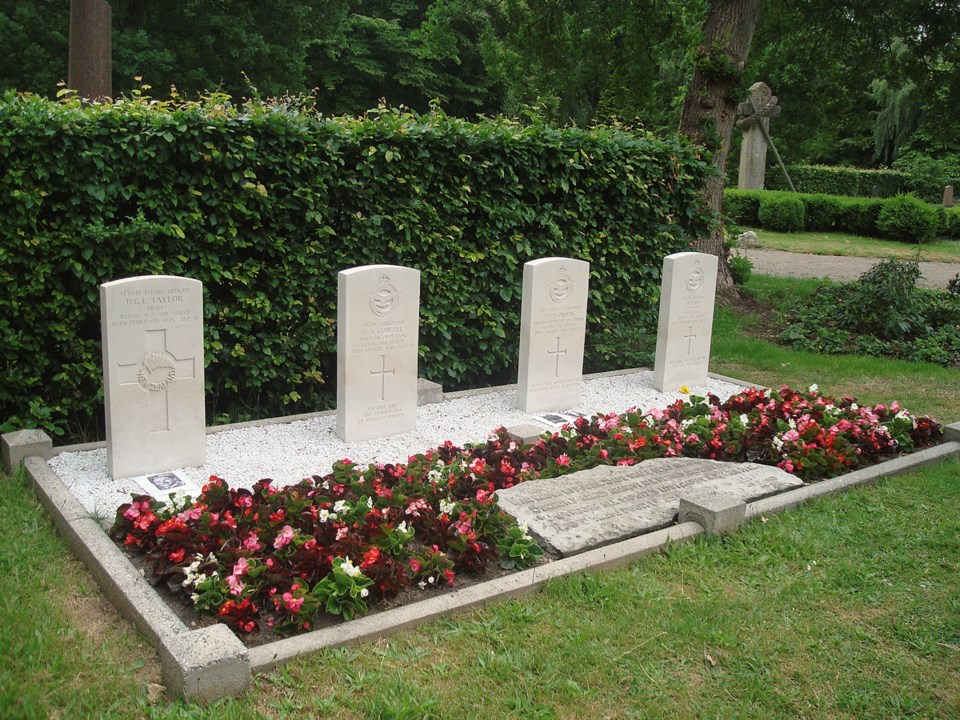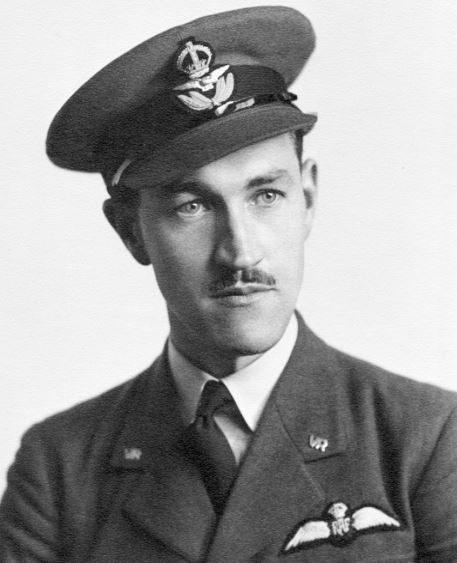“Target — aiming point at Bremen. Nothing was heard from this aircraft after leaving base.”
Lifted from official Royal Air Force (RAF) documents, that text recorded the last moments of Henry Law’s life.
The transcript is dated Aug. 18, 1941. Thirty-two years would pass until any substantive efforts were made to trace the final moments of his 26 years on the planet.
Another four decades went by until closure was brought to his family in Canada in August. Law attended UBC and spent his formative adult years in and around Vancouver.
Piecing together Law’s final days entailed voluminous amounts of research, cross referencing and correspondence across generations separated by close to 8,000 kilometres.
The process began, and was bookended, through the curiosity and devotion of Dirk Munk. At 62, Munk has poured countless hours into researching and documenting the Second World War — specifically those who fought and died near his home in Groningen, a city of about 200,000 in northern Holland.
Through his research, Munk discovered roughly 6,000 aircraft were destroyed in Holland during the war. He estimates about 500 crash sites with the remains of 1,085 airmen remained untouched. They are declared war graves in Holland.
For years, Munk has known about four graves linked to Commonwealth soldiers in the cemetery in Haren, a small town near Groningen. The stories behind the Dutch buried there are well known, Munk said, but nothing had been uncovered surrounding those four gravestones in particular.
“The interest in, and the respect for, the men that fought then is rising, also among the younger population,” Munk told the Courier via email from his home in Holland. “That is one of the reasons that people want these wrecks recovered — the men inside the wrecks deserve a real grave.”
The watch
Last year Munk came in to possession of an Ingersoll Leader pocket watch recovered from a Second World War plane crash site near Haren. While some details were sketchy, it’s believed the plane exploded in mid-air after being shot by a German pilot: some of the wreckage fell on land, the rest of it to the bottom of a lake.
Munk conversed with divers looking for the plane, an ongoing effort started in 1973. He told them of his research efforts and one of those divers gave him the watch with the expressed intent that it be returned to its owner’s relatives.

The watch came into the diver’s possession more than 20 years ago from the man who originally found it — a fellow by the name of H. Jager who died in his mid-80s more than two decades ago.
Jager lived next to the crash site and saw portions of the downed aircraft near his neighbour’s barn. He found the watch hanging from the wreckage, situated in the navigator’s seat. Law’s lifeless body was found next to a nearby creek.
Jager held on to the heirloom for six decades.
The watch is undamaged and still works.
Connecting the dots
The amount of legwork Munk then undertook was exhausting and extensive. Through online records, databases, emails, obituaries, census information and official wartime documents, Munk found the names of the four men on board the plane: they were Peter Orwin, George Cowell, Eric Maskell and Henry Law. Maskell was taken prisoner after the crash, the other three crew members died.
Munk connected with family members across the globe linked to three of the four men on board. He hit a roadblock, however, trying to find links to Henry Law. He found records of the family from a 1921 census, and sent emails to some of Law’s descendants in the U.S.
That correspondence dried up shortly after it began and the trail went cold until August of this year. He then found a church on Gabriola Island that Law’s grandfather built. He contacted church staff, who then put the feelers out with Island residents. Munk contacted the Courier around that time, looking for help in identifying Law’s family.
Shortly thereafter, he was put in contact with Law’s 69-year-old niece Ruby Chapman and her husband Ross. The couple lives in Victoria but has property on Gabriola. Some of the land on Gabriola has been in the Law family for more than a century.
Munk’s initial contact was followed by series of emotional emails and a massive connecting of the dots. Included in that correspondence was the official RAF record detailing Law’s death. At 26, he was the oldest crew member on board the plane.
Cross-continental relationship
“I was amazed to hear from the church that someone in Holland had information and Uncle Henry’s watch,” Ruby said. “His email was very touching and I was very moved by it. There was a mixture of emotions. When I read the official report of the plane crash that killed Uncle Henry it was very emotional. I cried when I read it.”
Ruby never met her uncle, though she did know some of his story through family scrapbooks, anecdotal information and letters sent home during the war.
Connecting with Munk has allowed the Chapmans intimate glimpses into his life and legacy.
Law was born in Nanaimo, but spent many of his adult years before the war in Vancouver. He studied engineering at UBC and was a commercial fishermen. He tried enlisting with the Canadian military, but was denied on account of a heart condition. Instead, he moved to the U.K. and enlisted with the RAF.
Incidentally, Ross visited Law’s final resting place in June, just months before Munk contacted him. He was in Holland on business, but made a point of finding the gravesite. He and Munk could have walked past one another and never known the cross-continental relationship that was about to unfold.
“I walked in through the gate and there they were: these graves were in the most immaculate graves in the entire cemetery — they shined up like stars,” said Ross, 70. “I was just blown away by the care that was evident around this grave site. There was a new garden full of begonias that had just been planted. This is 75 years later for heaven’s sakes. It’s amazing.”
“I’m very grateful and I feel a tremendous amount of gratitude for the city of Haren for the care and attention that they have paid to Uncle Henry’s grave site and to the other crew,” Ruby added. “It means a lot because it’s such a long way away. They are being so respectful and taking such good care of his memory.”

Munk is now lobbying politicians in Holland to erect a monument near the crash site, complete with photos of the crew and the plane, along with an explanation around the events of Aug. 18, 1941.
“If all goes well I hope to meet relatives of all crew members when the monument is unveiled,” Munk said. “It means a lot to me, after all I’ve been researching the crash for a long time now. I know for certain that it will also mean a lot to… the relatives of the other crew members of bomber.”
As for the watch, that issue is almost secondary to the Chapmans. The extended family spans across B.C. and Alberta, and if the watch ever crosses the Atlantic, relatives will have to decide who takes possession of it.
“If the watch ever comes over to Canada, it will be another aspect of completion, but for us, we know the story and we can put that to rest — that’s the most important thing,” Ross said. “This whole thing happened completely out of the blue, but we have since learned the whole story. It gives us some sense of completion. I don’t know if you can call it peace of mind, but it’s a settling experience.”
[email protected]
@JohnKurucz
This story has been revised since first published.



